外研社版(一起点)六年级英语下册M1-M10课件(共67张PPT).
文档属性
| 名称 | 外研社版(一起点)六年级英语下册M1-M10课件(共67张PPT). | 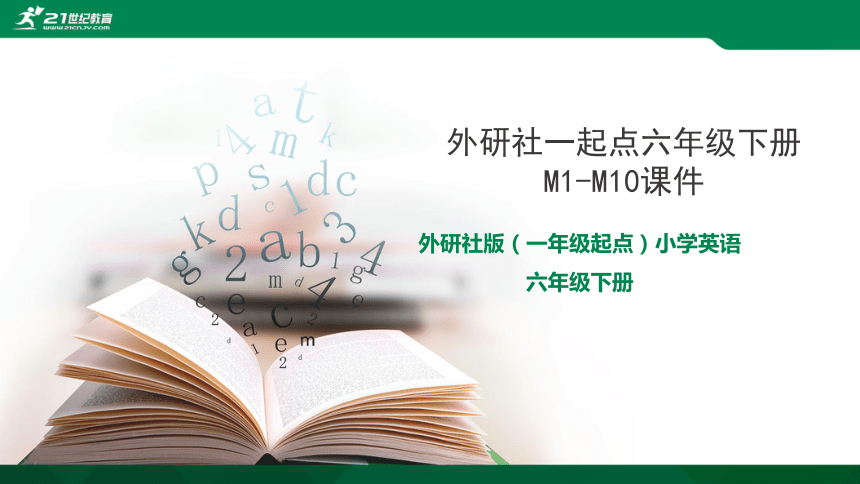 | |
| 格式 | zip | ||
| 文件大小 | 25.1MB | ||
| 资源类型 | 试卷 | ||
| 版本资源 | 外研版(一年级起点) | ||
| 科目 | 英语 | ||
| 更新时间 | 2021-04-06 18:29:14 | ||
图片预览

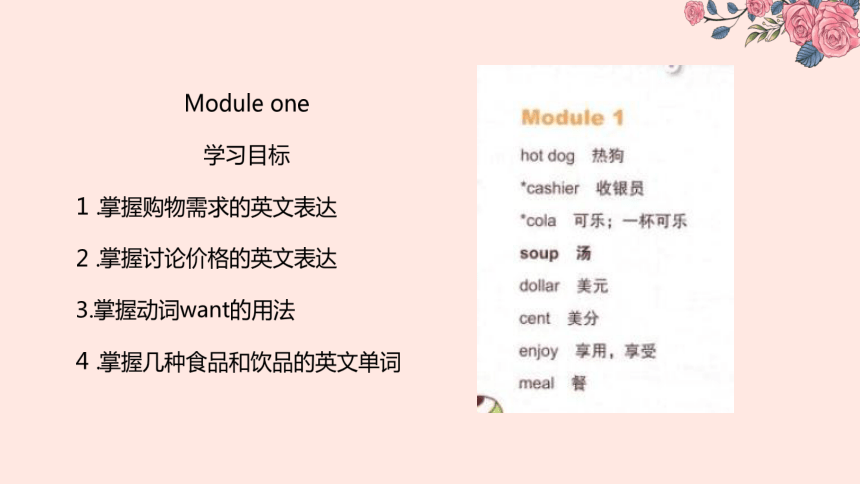
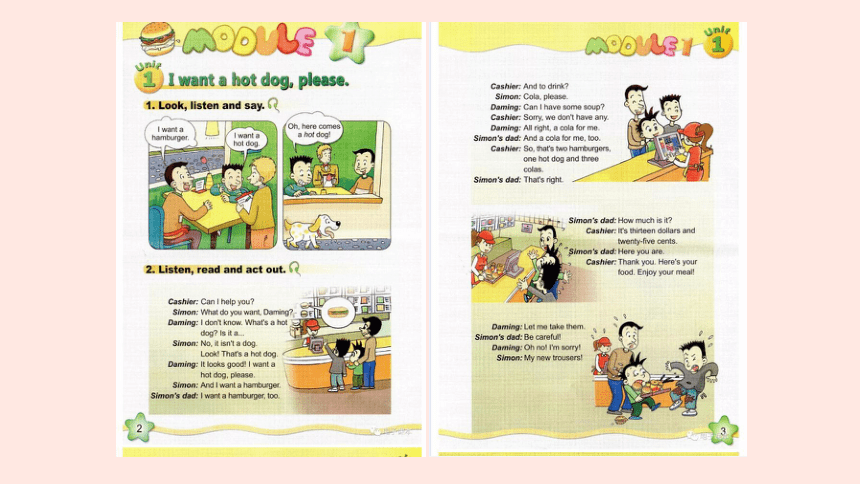

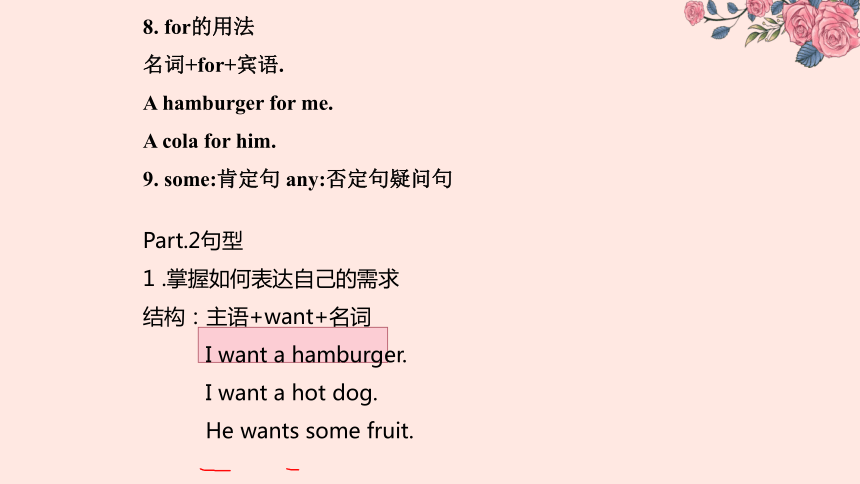
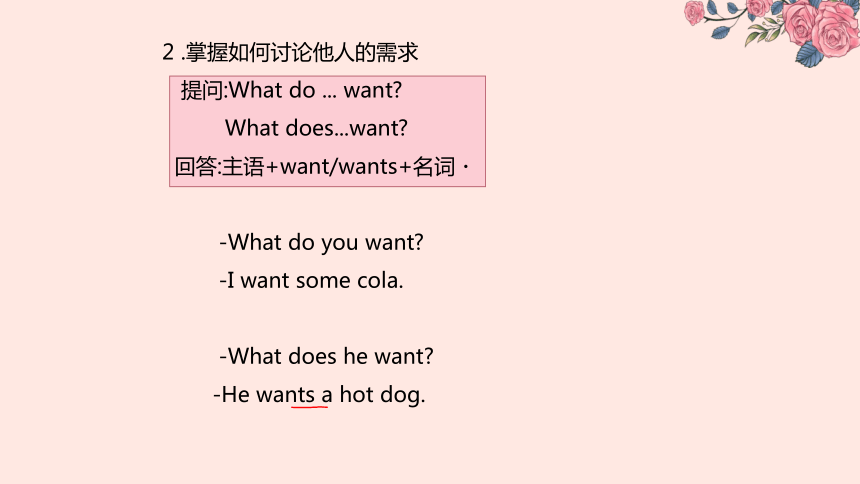
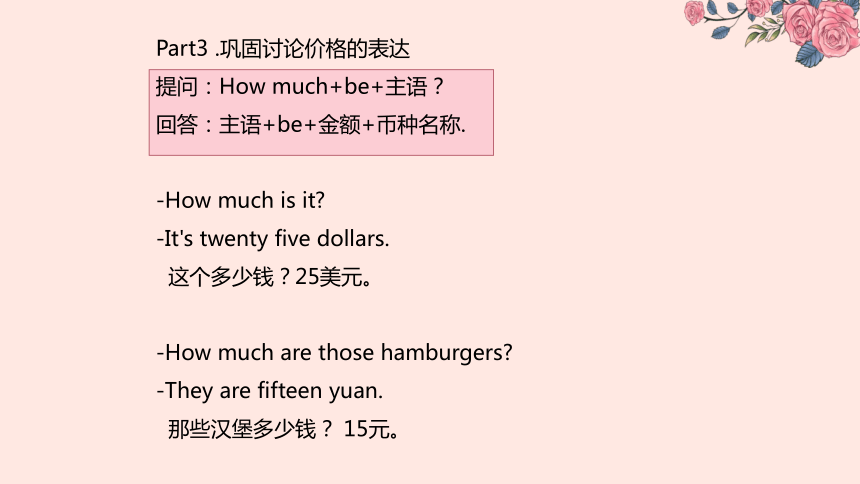
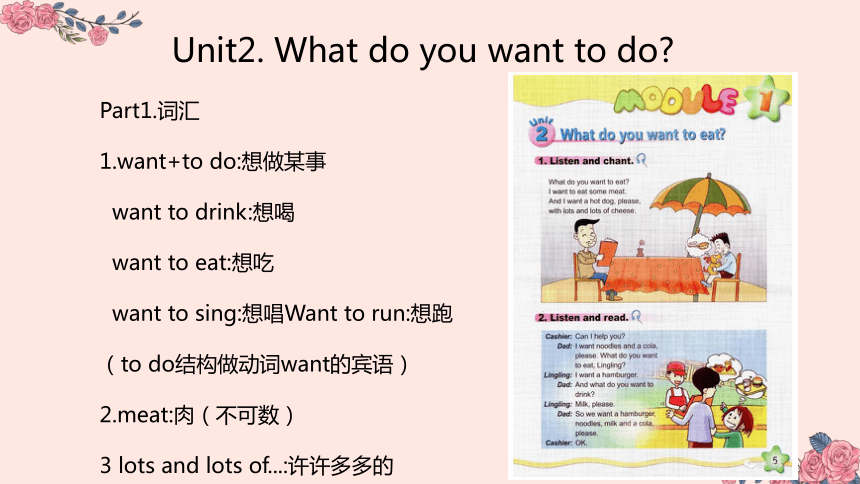
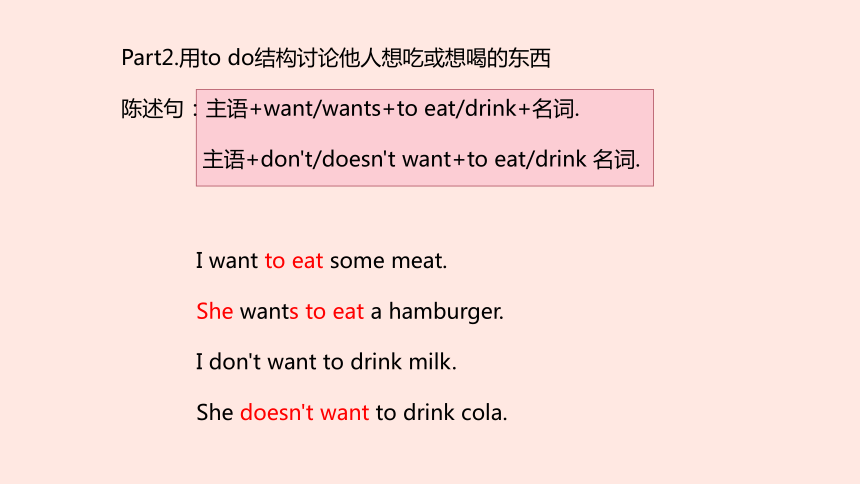
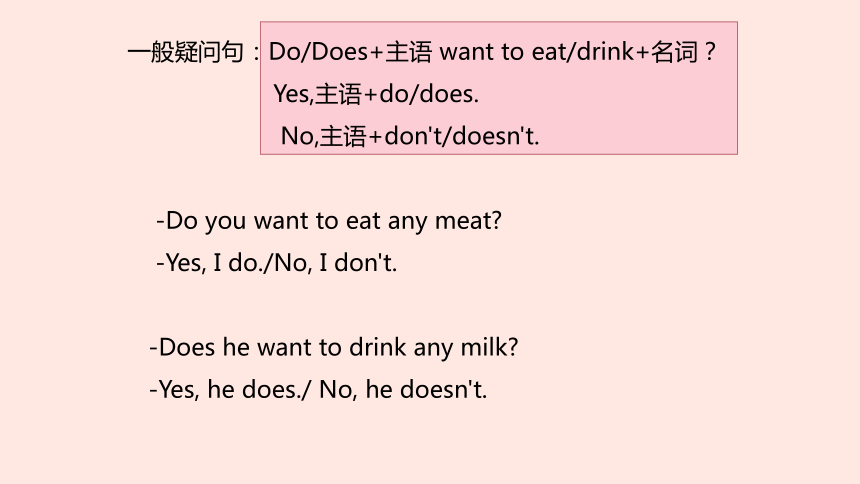
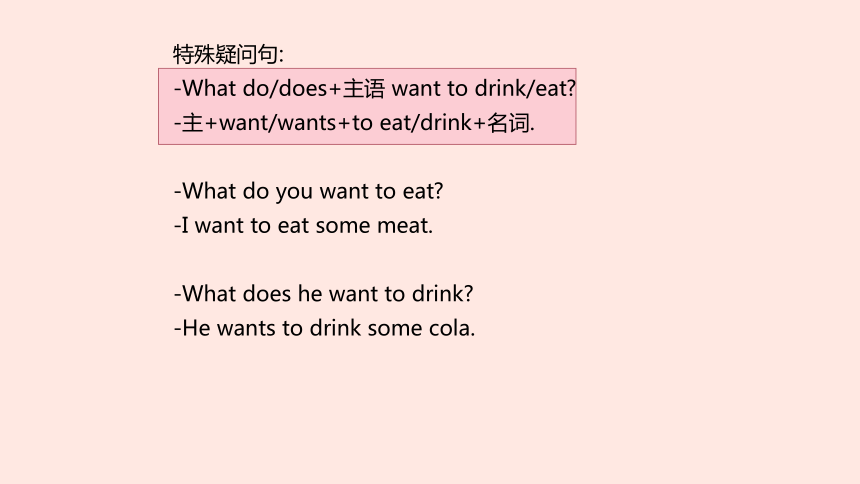
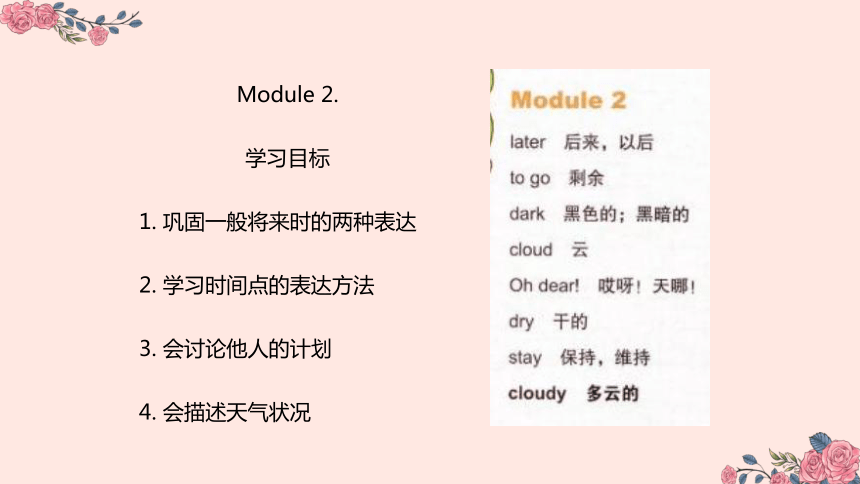
文档简介
(共67张PPT)
外研社一起点六年级下册
M1-M10课件
外研社版(一年级起点)小学英语
六年级下册
Module
one
学习目标
1
.掌握购物需求的英文表达
2
.掌握讨论价格的英文表达
3.掌握动词want的用法
4
.掌握几种食品和饮品的英文单词
Unit
1.
I
want
a
hot
dog,please.
Part1.词汇
1.
hamburger:汉堡
2
.hot
dog:热狗
3.
And
to
drink?
And
what
do
you
want
to
drink?
4
.soup:汤(不可数)ou—/u:/
5.
any:任何的、一些的(否定句和疑问句)
6.
cola-colas:可乐
7.
meal:餐、饭
8.
for的用法
名词+for+宾语.
A
hamburger
for
me.
A
cola
for
him.
9.
some:肯定句
any:否定句疑问句
Part.2句型
1
.掌握如何表达自己的需求
结构:主语+want+名词
I
want
a
hamburger.
I
want
a
hot
dog.
He
wants
some
fruit.
2
.掌握如何讨论他人的需求
提问:What
do
...
want?
What
does...want?
回答:主语+want/wants+名词?
-What
do
you
want?
-I
want
some
cola.
-What
does
he
want?
-He
wants
a
hot
dog.
Part3
.巩固讨论价格的表达
提问:How
much+be+主语?
回答:主语+be+金额+币种名称.
-How
much
is
it?
-It's
twenty
five
dollars.
这个多少钱?25美元。
-How
much
are
those
hamburgers?
-They
are
fifteen
yuan.
那些汉堡多少钱?
15元。
Unit2.
What
do
you
want
to
do?
Part1.词汇
1.want+to
do:想做某事
want
to
drink:想喝
want
to
eat:想吃
want
to
sing:想唱Want
to
run:想跑
(to
do结构做动词want的宾语)
2.meat:肉(不可数)
3
lots
and
lots
of...:许许多多的
Part2.用to
do结构讨论他人想吃或想喝的东西
陈述句:主语+want/wants+to
eat/drink+名词.
主语+don't/doesn't
want+to
eat/drink
名词.
I
want
to
eat
some
meat.
She
wants
to
eat
a
hamburger.
I
don't
want
to
drink
milk.
She
doesn't
want
to
drink
cola.
一般疑问句:Do/Does+主语
want
to
eat/drink+名词?
Yes,主语+do/does.
No,主语+don't/doesn't.
-Do
you
want
to
eat
any
meat?
-Yes,
I
do./No,
I
don't.
-Does
he
want
to
drink
any
milk?
-Yes,
he
does./
No,
he
doesn't.
特殊疑问句:
-What
do/does+主语
want
to
drink/eat?
-主+want/wants+to
eat/drink+名词.
-What
do
you
want
to
eat?
-I
want
to
eat
some
meat.
-What
does
he
want
to
drink?
-He
wants
to
drink
some
cola.
Module
2.
学习目标
1.
巩固一般将来时的两种表达
2.
学习时间点的表达方法
3.
会讨论他人的计划
4.
会描述天气状况
Unit1.
When
are
we
going
to
eat?
Part1.
Read
and
learn
part1.
1.
get
up:起床
go
to
bed:去睡觉
2.
half
past+时间:…点半
half
past
eleven:—点半
half
past
nine:九点半
3.
have+三餐名称:吃…餐
have
breakfast
lunch
dinner
Part2.
Read
and
learn
part2
1.
have
a
picnic:野餐(动词)
2.
in
the
park:在公园里(介词短语做状语)
3.
One
hour
to
go.还要走1个小时
4.
on
the
lake:在湖面上
5.
dark
clouds:乌云
6.
so:如此、这样
7.
drinks:饮品(表示不同种类的饮品)
8.
over
there:在那边
9.
look
like:看起来像…
10.
stay:继续;仍然
stay
hungry:继续饿着
Part3.巩固be
going
to表示将来
be
going
to+地点:打算去某地
be
going
to+动词原形:打算做某事
陈述句
肯定式:
主语+be
going
to+地点/动词原形.
否定式:
主语+be
not
going
to
+地点/动词原形.
I
am
going
to
Shandong.
我打算去山东。
I
am
not
going
to
have
lunch
today.
我今天不打算吃午饭。
She
is
not
going
to
France.
她不打算去法国。
Peter
is
going
to
have
a
picnic
with
his
friends.
彼得打算和他的朋友们野餐。
We
are
going
to
wait
for
the
bus.
我们要等公共汽车。
一般疑问句
Be+主语+going
to+地点/动词原形?
Yes,
...be./No,
...be
not.
-Are
we
going
to
have
our
picnic?
-Yes,
we
are.
我们要野餐吗?是的。
-Is
Amy
going
to
see
ducks?
-No,
she
isn't.
艾米要看看鸭子吗?不,她不看
特殊疑问句:
特殊疑问词+一般疑问句?
What
are
you
going
to
do?
When
are
you
going
to
run?
Who
are
you
going
to
run
with?
Where
are
you
going
to
run?
Why
are
you
going
to
run?
How
are
you
going
to
run?
How
long
are
you
going
to
run?
Unit2.
It
will
rain
in
Beijing.
Part1.词汇
1.描述天气的词汇
动词词性
be
sunny
晴天
snow下雪
be
windy
刮风
rain
下雨
be
cloudy
多云/阴天
2.
形容词词性
sunny
cloudy
windy
warm
snowy
rainy
hot
cold
cool
Part2.
用will引导的一般将来时讨论天气
1.陈述句
It
will+动词原形+表将来的日期.
It
won't+动词原形+表将来的日期.
It
will
snow
tomorrow.
It
will
be
sunny
the
day
after
tomorrow.
It
will
not
snow
tomorrow.
It
won't
be
sunny
the
day
after
tomorrow.
2.
一般疑问句
-Will+it+动词原形+表将来的日期
-Yes,
it
will./
No,
it
won't.
(won't=will
not)
-Will
it
snow
tomorrow?
-Yes,
it
will.
-Will
it
be
snowy
tomorrow?
-No,
it
won't.
3.
特殊疑问句询问天气状况
-What
will
the
weather
be
like+表将来的日期/地点?
-It
will+动词原形.
-What
will
the
weather
be
like
next
Friday?
-It
will
rain
next
Friday.
-What
will
the
weather
be
like
in
Shanghai?
-It’s
will
be
hot.
Module3.
学习目标
1.
巩固一般过去时
2.
巩固现在进行时
3.
掌握一些单词和词组
Unit1.
I
took
some
photos.
Part1.
词汇
1.
last+表示时间的词语---表示过去
last
Sunday
last
night
last
week
last
month
last
season
last
year
2.
a
book
about....:一本关于...的书
3.
a
letter
from....:一封来自...的信
4.
take
photos:
拍照/摄影
5.
start
to
do/doing:开始做某事
6.
leave
sth/sb:
离开.../丢下....
7.
be
angry
with
sb:
生某人的气
Part2.巩固一般过去时
1.
描述过去发生的事情
2.
描述过去的习惯、规律和常做的事
陈述句:
主语+动词过去式+地点/时间.
主语+didn't+动词原形+地点/时间.
I
received
a
letter
from
Lingling.
I
didn't
receive
a
letter
from
Lingling.
主语+was/were+表语.
主语+wasn't/weren't+表语.
He
was
in
Britain
last
year.
He
wasn't
in
Britain
last
year.
They
were
at
home
yesterday.
They
weren't
at
home
yesterday.
一般疑问句:
Did+主语+动词原形?
Yes,
...did./
No,
...didn't.
Did
you
receive
a
letter
from
Lingling?
Yes,
I
did.
Did
Amy
go
shopping
last
weekend?
No,
she
didn't.
Was/Were+主语+表语?
Yes,
....was/were.
No,
...wasn't/weren't.
Was
he
in
Britain
last
year?
Yes,
he
was.
Were
they
at
home
yesterday?
No,they
weren't.
特殊疑问句:特殊疑问词+一般疑问句?
What
did
you
do
yesterday?
When
did
you
take
photos?
Where
did
you
take
photos?
Who
did
you
take
photos
with?
Why
did
you
take
photos?
What
was
the
weather
like
yesterday?
Where
were
you
yesterday?
Why
were
you
so
sad
yesterday?
When
were
you
at
school
yesterday?
How
did
you
take
photos?
Unit2.
The
sun
is
shining.
Part1.词汇
1.look
at:看...
look
at
the
naughty
boy
look
at
the
dog
2.
little:小的(个头小、年龄小)
3.
in
the
photo:在照片中
4.
shine:照耀、闪耀
5.
fly
away:
飞走...
Part2.
巩固现在进行时
1.表示此时此刻正在发生的动作
2.表示一段时间内持续发生的动作
谓语部分的结构:
肯定式:be+doing
否定式:be
not+doing
陈述句:主语+be+doing+(时间/地点)
主语+be
not
doing+(时间/地点)
I
am
singing.
I
am
not
singing.
The
bird
is
flying.
The
bird
isn't
flying.
They
are
running.
They
aren't
running.
一般疑问句:
Be+主语+doing?
Yes,
...is/are.
No,
...isn't/aren't
.
-Are
you
singing?
-Yes,
I
am.
-Is
the
bird
flying?
-No,
it
isn't.
-Are
they
running?
-Yes,
they
are.
特殊疑问句:疑问词+一般疑问句?
What
are
you
doing?
Where
are
you
running?
Who
are
you
running
with?
Why
are
you
running?
How
are
you
running?
动词现在分词的变化规则
1.
直接+ing
sing-singing
look-looking
2.
辅音字母+e结尾的,去e+ing
以不发音的e结尾
take-taking
live-living
make-making
3.
“辅元辅”结尾的单词,
以重读闭音节+1个辅音字母结尾
双写末尾的辅音字母+ing
run-running
sit-sitting
stop-stopping
4.
部分以ie结尾的单词,变ie为y+ing
lie-lying
tie-tying
Module4
学习目标
1.
巩固情态动词can的含义和用法
2.
巩固情态动词can在各种句式中的表达
3.
掌握一些单词和词组的含义及用法
4.
继续巩固现在进行时
Unit1.
I
can’t
carry
all
these
things.
Part1.
词汇部分
1.
do
one’s
homework:做某人的作业
2.
make
a
card:做卡片/做贺卡
3.
hard:努力地、刻苦地
study
hard:努力学习
work
hard:
努力工作
4.
at
the
supermarket:在超市
5.
buy...for...:
买某物给某人/为某人买某物
6.
American:
美式的
7.
on
the
phone:
正在打电话
8.
The
oranges
are
falling.橙子掉下来了.
9.
need
sth/sb:需要某物/某人
10.
grab:(用手)抓住
catch
Part2.
巩固情态动词can的用法和含义
can---表示具备某种能力:会做、能做
---表示经过允许可以做某事:可以
否定式:can't/cannot
用法:can/can't+动词原形
陈述句:主语+can/can't+动词原形.
I
can
help
you.
我能帮你。
She
can't
go
out
to
play.
她不能出去玩。
一般疑问句:
-Can+主语+动词原形?
-Yes,
...can./
No,
...can’t.
-Can
she
play
outside?
-Yes,
she
can.
她可以在外面玩吗?
可以.
-Can
you
speak
French?
-No,
I
can’t.
你会讲法语吗?
不,我不会。
特殊疑问句:特殊疑问词
+一般疑问句?
What
can
you
sing?
你会唱什么?
Who
can
you
sing
with?
你可以和谁唱?
Where
can
you
sing?
你可以在哪里唱?
Why
can
you
sing?
为什么你可以/会唱?
How
can
you
sing?
你怎么能唱的?
Unit2.
The
apples
are
falling
down
the
stairs!
Part1.
词汇部分
1.
fall
down:掉下、掉落
fall
off
2.
mess:
混乱
What
a
mess!
好乱啊!
Part2.
巩固can的用法以及现在进行时
我能拿得动这个包。
I
can
carry
this
bag.
他不会做数学题。
He
can't
do
the
maths.
我们可以在公园里野餐吗?
是的,可以。
Can
we
have
a
picnic
in
the
park?
Yes,
you
can./Yes,
we
can.
熊猫在干什么?
它在吃竹子。
-What
is
the
panda
doing?
-It
is
eating
bamboo.
你们在干什么?我们在吃三明治。
-What
are
you
doing?
-We
are
eating
sandwhiches.
大明在干什么?
他在看报纸。
-What
is
Daming
doing?
-He
is
reading
newspaper.
艾米在跳舞吗?
是的。
-Is
Amy
dancing?
-Yes,
she
is.
你的爸爸在看电视吗?
不,不是。
-Is
your
father
watching
TV?
-No,
he
isn't.
他们在踢足球吗?是的。
-Are
they
playing
football?
-Yes,
they
are.
你在拿这个箱子吗?不,不是。
-Are
you
carrying
the
box?
-No,
I
am
not.
他们正在打排球。
They
are
playing
volleyball.
山姆正在喝一杯可乐。
Sam
is
drinking
a
cola.
我们没在看电影。
We
are
not
seeing
a
film.
他们没有吹长笛。
They
are
not
playing
the
flute.
Module
5
学习目标
1.巩固一般现在时和现在进行时
2.在同一句话中灵活运用一般现在时
和现在进行时来描述
3.掌握一些单词和词组的含义和用法
Unit1.
He
is
playing
the
suona,
but
the
telephone
rings.
Part2.
会结合现在进行时与一般现在时描述动作,
表示一个动作发生在另一个动作正在进行之时
结构:主语+be
+doing,
主语+动词原形/三单.
Sam
is
playing
the
suona,
the
telephone
rings.
山姆正在吹唢呐的时候电话响了。
I
am
washing
clothes,
my
parents
come
in.
我正在洗衣服,我爸爸妈妈进来了。
Part1.
词汇
1.
ring:
叮铃声
2.
bark:犬吠声
3.
Play
the
suona:吹唢呐
4.play....music/song:演奏...音乐/歌曲
5.
again:又、再(副词),在动词后
Unit2.
Some
children
are
jumping
in
the
water.
词汇
1.
hardly:几乎不...(副词)
I
can
hardly
see
you.
我就要看不到你了。
She
hardly
has
lessons
at
the
weekends.
周末她几乎没有课。
2.
be
on
a
train:在火车上
3.
look
out
of...从...向外看
look
out....:当心...
4.
go
into:
走进/驶入
5.
come
out
of...:
从...当中出来
6.
arrive
at:到达某个很具体的地点
arrive
in:
到达大范围、不太具体的地点
Module
6.
学习目标
1.
巩固一般过去时
2.
掌握一些单词和词组的含
义及用法
3.
会用一般过去时描述过去
发生的事情
Unit1.
It
was
Daming’s
birthday
yesterday
Part1.
词汇
1.
Welcome
home!
欢迎回家!
Welcome
to+地点.
欢迎到某地
Welcome
to
the
zoo.
Welcome
to
China.
home前不加to
2.
名词+for+宾语:给某人某物
...是给...的
This
T-shirt
is
for
you.
这件T恤衫是给你的。
The
new
computer
is
for
Tom.
这台新电脑是给汤姆的。
3.
get...from...:从...得到....
4.
buy
sb
sth:给某人买某物
=buy
sth
for
sb
5.
space
travel:太空旅行
6.
be
interested
in
+名词/动词ing:
对...感兴趣
I
am
interested
in
space
travel.
我对太空旅行感兴趣。
She
is
interested
in
playing
basketball.
她对打篮球感兴趣。
7.
love/like...very
much:
非常热爱/喜欢...
8.
show
sb
sth:
给某人看某物
9.
ask
sb
to
do:
让某人做某事
Daming
asked
Simon
to
read
the
book
with
him.
大明让西蒙和他一起看书。
Our
teacher
asks
us
to
do
some
sports.
我们老师让我们做一些运动。
句子翻译
1.
去年我十岁。
I
was
ten
years
old
last
year.
2.
看到飞船大明很惊讶。
Da
ming
was
surprised
to
see
the
spaceship.
3.
大明给西蒙看了那本书。
Da
ming
showed
Simon
that
book.
4.
山姆上周没看电影。
Sam
didn't
see
a
film
last
week.
5.
昨天你们野餐了吗?是的。
Did
you
have
a
picnic
yesterday?
Yes,
we
did.
6.
他们昨晚看足球赛了吗?没看。
Did
they
watch
a
football
game
last
night?
No,
they
didn't.
7.
她什么时候去图书馆的?
When
did
she
go
to
the
library?
8.
去年他是怎么学开车的?
How
did
he
learn
to
drive
last
year?
10.
be
surprised
to
do:
做某事很惊讶/....很惊讶
he
was
surprised
to
see:
看到...很他惊讶
I
am
surprised
to
know...:
知道...我很惊讶
11.
thank
sb
for
sth:
为...而感谢某人
Part2.
巩固一般过去时
动词过去式的规则变化
1.
词尾+ed
look-looked
watch-watched
2.
以e结尾的,直接+d
move-moved
like-liked
3.
以辅音字母+y结尾的单词,变y为i+ed
cry-cried
study-studied
4.
以重读闭音节+1个辅音字母结尾的
双写末尾辅音字母+ed
stop-stopped
travel-travelled
Unit2.
The
name
of
the
spaceship
is
Shenzhou
V.
Part1.
词汇
1.
make
...for...:为...做...
2.
a
model
of...:一个...的模型
3.
taikonaut:
(中国的)宇航员/航天员
astronaut:宇航员、航天员
4.
take...into
space:把...送入太空
5.
national
flag:
国旗
the
national
flag
of...:...的国旗
Part2.
练习
用所给单词的正确形式填空
1.
I
didn’t
_buy_
(buy)
any
fruit
yesterday.
2.
He
_travelled__(travel)to
Shanghai
last
summer
with
his
friends.
3.
What
book
_did_(do)
_they_
(them)
read
last
month?
4.
Did
Peter
_cook_
(cooked)noodles
last
night?
5.
We
couldn’t
_sing_
(sing)
the
song
last
year.
6.
What
_did__
(do)
you
wear
yesterday
evening?
Module
7
学习目标
1.
巩固用一般过去时描述过去发生的事情
2.
巩固动词变过去式的规则
3.掌握一些单词和词组的含义和用法
Unit1.
My
father
flew
into
space
in
Shenzhou
V.
Part1.
词汇
1.
fly
to...:飞到.../飞向...
2.
long
ago=long
time
ago:很久以前
...ago:...以前(表示过去)
3.
make
a
video:制作一份录像
4.
come
back
to...:返回...
5.
be
proud
of...:为...而骄傲/自豪
6.
tell
sb
about...:告诉某人关于...事
给某人讲关于..的事
7.
someday:
某天/有一天
Part2.
巩固用一般过去时描述过去发生的事情
结构:
主语+过去式+地点/时间/方式
主语+was/were+表语+时间/地点/方式
My
father
went
to
the
supermarket
yesterday.
Yang
Liwei
flew
into
the
space
in
Shenzhou
V
in
October
2003.
She
was
a
doctor
five
years
ago.
They
were
in
the
park
with
us
last
Sunday.
They
and
we
were
in
the
park
last
Sunday.
They
didn’t
go
to
the
airport.
He
wasn’t
at
the
airport.
Unit2.
She
couldn’t
see
or
hear.
Part1.
词汇
1.
could:can的过去式
could/couldn’t+动词原形
(过去)会/不能做某事
2.
Helen
Keller:海伦凯勒
3.
was
born:出生于
4.
have
an
illness:
生病
ill:生病的(形容词)
illness:疾病(名词)
5.
at+年龄/月龄:在某人..岁时/..个月时
She
had
an
illness
at
nineteen
months
old.
她十九个月大时生了一场疾病。
They
could
speak
French
at
eight
years
old.
他们八岁时会讲法语。
6.
learn
to
do:
学着做某事
7.
hard:努力地
、辛苦地、用功地
8.
a
model
for....:
一个...的榜样
She
is
a
model
for
blind
people.
她是盲人的一个榜样。
Part2.
练习---根据短文内容用所给单词的正确形式填空
Three
years
ago
we
began
(begin)
to
learn
English.
Our(We)English
teacher
taught
us
in
many
ways(way),
so
we
were
(be)
interested
in
English
lessons.
We
often
sang,
danced,
chanted
and
played
(play)
games.
Our
teacher
usually
let
us
do
things
by
ourselves.
We
did
(did)
interesting
tasks.
Sometimes
we
did
(do)
role
play.
We
used
words
and
sentences
to
tell
(telling)
stories.
We
often
worked
in
pairs
and
groups
(group).
We
all
did
a
good
job!
Module
8.
学习目标
1.
掌握用Why引导的特殊疑问句
讨论事件的原因
2.
掌握一些单词和词组
Unit1.
Why
do
you
have
cups
on
your
heads?
1.
巩固几个表示位置的词语
on:在...的上面
in:在...的内部
under:在...的下方
2.
see:看到(强调看到的结果)
look:看(强调看的动作)
watch(强调看的过程)
3.
have
cups
on
heads:头上有杯子/头上放着杯子
4.
laugh:笑
laugh
at
...:嘲笑....
5.
plan
to
do:打算做某事/计划做某事
6.
baseball:棒球
7.
ask
sb
to
do:让某人做某事
8.
bring
sth:带来某物
9.
be
easy
to
do:
做某事很容易
be
difficult
to
do:
做某事很难
形容词+to
do
10.
make
a
mistake/make
mistakes:犯错误
Part2.
学习用why讨论事情的原因
提问:Why+do/does/did+主语+动词原形+时间/地点?
Why
is/are/was/were+主语+表语?
回答:Because+主语+谓语动词(+宾语).
Because+主语+系动词+表语.
-Why
do
you
like
music?
-Why
are
you
late
for
work?
-Because
I
feel
relaxed.
-Because
there
is
something
wrong
with
my
car.
-你为什么喜欢音乐?
-你上班为什么迟到了?
-因为我觉得很放松。
-因为我的车出了一些问题.
Unit2.
Why
are
you
wearing
a
hat?
Part1.
词汇
1.
hide-and-seek:
捉迷藏
2.
raincoat:雨衣
3.
go
to
the
theatre:
去电影院/去剧院
4.
be
going
to:即将...
将来时
按计划、有迹象表明要发生
be-am/is/are
Part2.
巩固用why引导的特殊疑问句讨论原因
1.
为什么你起得这么早?因为我想在家吃早餐。
-Why
do
you
get
up
so
early?
-Because
I
want
to
have
breakfast
at
home.
2.
为什么你们这么开心?因为我们今天没有作业.
-Why
are
you
so
happy?
-Because
we
don't
have
any
homework
today.
3.
你为什么穿短裤?因为天就要热了。
-Why
do
you
wear
a
pair
of
shorts?
Why
are
you
wearing
a
pair
of
shorts?
-Because
it
is
going
to
be
hot.
Module
9.
学习目标
1.
巩固be
going
to结构表示将来
2.
结合学过的时态和词组描述
小学里同学做的事
3.
会用一些祝福语
Unit1.
Best
wishes
to
you!
Part1.
词汇
1.
wish-wishes:
祝福;祝愿
best
wishes
to
sb:给某人最好的祝福
2.
good
luck
to
sb:
祝某人好运
good
luck
for
sth:
祝某事好运
3.
say
goodbye
to...:和...说再见
4.
enjoy:享受
5.
write
a
message:写个留言条
6.
keep...:保留.../保存...
7.
help
sb
in
sth:
在某方面帮助某人
8.
wonderful:美好的/很棒的
1.
miss:想念
miss
sb/sth:想念某人/某事
2.
write
goodbye
letters:写告别信
3.
first:首先
(表示步骤时无需加the)
then:然后
4.for:给...
4.
wish
sb
sth:
祝福某人某事
whish
you
happiness
whish
you
good
luck
5.
What
a
lot
of
...:这么多的...呀!
Module
10
学习目标
1.
巩固用be
going
to
表示将来
2.
学会用英语表达自己的情感
3.
学习几门课程的英文名称
Unit1.
We’re
going
to
different
schools.
Part1.
词汇
1.
middle
school:中学
2.
leave:离开
3.
soon:很快;就要
4.
excited:
激动的
5.
history:历史
6.
geography:地理
ph-/f/
7.
at
the
same
time:与此同时
8.
be
sad
to
do:
做某事很难过
be
happy
to
do
形容词+to
do
9.
go
back
to:返回...
10.
be
happy
for
sb:为某人感到高兴
11.
keep
on
doing:
坚持做某事
12.
a
lot
more:更多
13.
write
emails
to
sb:
给某人写电子邮件
Part2.
语法
巩固be
going
to
表示将来的用法
be
going
to+地点:打算去某地
be
going
to
do:打算做某事
陈述句
主语+be
going
to+动词原形/地点.
主语+be
not
going
to+动词原形/地点.
I
am
going
to
write
a
goodbye
letter.
我打算写一封告别信。
She
is
going
to
see
a
film.
她准备看一场电影。
They
are
not
going
to
Sanya.
他们不打算去三亚。
Unit2.
I’m
going
to
Lake
Middle
School.
1.
Chemistry:化学
2.
happily:
幸福地(副词,修饰动词)
3.
French:法语
France:法国
4.
Physics:
物理
一般疑问句:
Be+主语+going
to+动词原形/地点?
Yes,
主语+be./No,
主语+be
not.
Are
you
going
to
Dalian?
Yes,
I
am.
你要去大连吗?是的。
Is
Amy
going
to
make
a
model
of
spaceship?
No,
she
isn't.
艾米打算做一个飞船的模型吗?不,她不打算。
Are
they
going
to
say
goodbye
to
each
other?
Yes,
they
are.
他们要对彼此说再见了吗?是的。
特殊疑问句:特殊疑问词+一般疑问句?
What
is
Peter
going
to
write?
When
is
Peter
going
to
write?
Where
is
Peter
going
to
write?
Who
is
Peter
going
to
write
to?
Why
is
Peter
going
to
write?
How
is
Peter
going
to
write?
How
long
is
Peter
going
to
write?
谢谢
21世纪教育网(www.21cnjy.com)
中小学教育资源网站
有大把高质量资料?一线教师?一线教研员?
欢迎加入21世纪教育网教师合作团队!!月薪过万不是梦!!
详情请看:
https://www.21cnjy.com/help/help_extract.php
外研社一起点六年级下册
M1-M10课件
外研社版(一年级起点)小学英语
六年级下册
Module
one
学习目标
1
.掌握购物需求的英文表达
2
.掌握讨论价格的英文表达
3.掌握动词want的用法
4
.掌握几种食品和饮品的英文单词
Unit
1.
I
want
a
hot
dog,please.
Part1.词汇
1.
hamburger:汉堡
2
.hot
dog:热狗
3.
And
to
drink?
And
what
do
you
want
to
drink?
4
.soup:汤(不可数)ou—/u:/
5.
any:任何的、一些的(否定句和疑问句)
6.
cola-colas:可乐
7.
meal:餐、饭
8.
for的用法
名词+for+宾语.
A
hamburger
for
me.
A
cola
for
him.
9.
some:肯定句
any:否定句疑问句
Part.2句型
1
.掌握如何表达自己的需求
结构:主语+want+名词
I
want
a
hamburger.
I
want
a
hot
dog.
He
wants
some
fruit.
2
.掌握如何讨论他人的需求
提问:What
do
...
want?
What
does...want?
回答:主语+want/wants+名词?
-What
do
you
want?
-I
want
some
cola.
-What
does
he
want?
-He
wants
a
hot
dog.
Part3
.巩固讨论价格的表达
提问:How
much+be+主语?
回答:主语+be+金额+币种名称.
-How
much
is
it?
-It's
twenty
five
dollars.
这个多少钱?25美元。
-How
much
are
those
hamburgers?
-They
are
fifteen
yuan.
那些汉堡多少钱?
15元。
Unit2.
What
do
you
want
to
do?
Part1.词汇
1.want+to
do:想做某事
want
to
drink:想喝
want
to
eat:想吃
want
to
sing:想唱Want
to
run:想跑
(to
do结构做动词want的宾语)
2.meat:肉(不可数)
3
lots
and
lots
of...:许许多多的
Part2.用to
do结构讨论他人想吃或想喝的东西
陈述句:主语+want/wants+to
eat/drink+名词.
主语+don't/doesn't
want+to
eat/drink
名词.
I
want
to
eat
some
meat.
She
wants
to
eat
a
hamburger.
I
don't
want
to
drink
milk.
She
doesn't
want
to
drink
cola.
一般疑问句:Do/Does+主语
want
to
eat/drink+名词?
Yes,主语+do/does.
No,主语+don't/doesn't.
-Do
you
want
to
eat
any
meat?
-Yes,
I
do./No,
I
don't.
-Does
he
want
to
drink
any
milk?
-Yes,
he
does./
No,
he
doesn't.
特殊疑问句:
-What
do/does+主语
want
to
drink/eat?
-主+want/wants+to
eat/drink+名词.
-What
do
you
want
to
eat?
-I
want
to
eat
some
meat.
-What
does
he
want
to
drink?
-He
wants
to
drink
some
cola.
Module
2.
学习目标
1.
巩固一般将来时的两种表达
2.
学习时间点的表达方法
3.
会讨论他人的计划
4.
会描述天气状况
Unit1.
When
are
we
going
to
eat?
Part1.
Read
and
learn
part1.
1.
get
up:起床
go
to
bed:去睡觉
2.
half
past+时间:…点半
half
past
eleven:—点半
half
past
nine:九点半
3.
have+三餐名称:吃…餐
have
breakfast
lunch
dinner
Part2.
Read
and
learn
part2
1.
have
a
picnic:野餐(动词)
2.
in
the
park:在公园里(介词短语做状语)
3.
One
hour
to
go.还要走1个小时
4.
on
the
lake:在湖面上
5.
dark
clouds:乌云
6.
so:如此、这样
7.
drinks:饮品(表示不同种类的饮品)
8.
over
there:在那边
9.
look
like:看起来像…
10.
stay:继续;仍然
stay
hungry:继续饿着
Part3.巩固be
going
to表示将来
be
going
to+地点:打算去某地
be
going
to+动词原形:打算做某事
陈述句
肯定式:
主语+be
going
to+地点/动词原形.
否定式:
主语+be
not
going
to
+地点/动词原形.
I
am
going
to
Shandong.
我打算去山东。
I
am
not
going
to
have
lunch
today.
我今天不打算吃午饭。
She
is
not
going
to
France.
她不打算去法国。
Peter
is
going
to
have
a
picnic
with
his
friends.
彼得打算和他的朋友们野餐。
We
are
going
to
wait
for
the
bus.
我们要等公共汽车。
一般疑问句
Be+主语+going
to+地点/动词原形?
Yes,
...be./No,
...be
not.
-Are
we
going
to
have
our
picnic?
-Yes,
we
are.
我们要野餐吗?是的。
-Is
Amy
going
to
see
ducks?
-No,
she
isn't.
艾米要看看鸭子吗?不,她不看
特殊疑问句:
特殊疑问词+一般疑问句?
What
are
you
going
to
do?
When
are
you
going
to
run?
Who
are
you
going
to
run
with?
Where
are
you
going
to
run?
Why
are
you
going
to
run?
How
are
you
going
to
run?
How
long
are
you
going
to
run?
Unit2.
It
will
rain
in
Beijing.
Part1.词汇
1.描述天气的词汇
动词词性
be
sunny
晴天
snow下雪
be
windy
刮风
rain
下雨
be
cloudy
多云/阴天
2.
形容词词性
sunny
cloudy
windy
warm
snowy
rainy
hot
cold
cool
Part2.
用will引导的一般将来时讨论天气
1.陈述句
It
will+动词原形+表将来的日期.
It
won't+动词原形+表将来的日期.
It
will
snow
tomorrow.
It
will
be
sunny
the
day
after
tomorrow.
It
will
not
snow
tomorrow.
It
won't
be
sunny
the
day
after
tomorrow.
2.
一般疑问句
-Will+it+动词原形+表将来的日期
-Yes,
it
will./
No,
it
won't.
(won't=will
not)
-Will
it
snow
tomorrow?
-Yes,
it
will.
-Will
it
be
snowy
tomorrow?
-No,
it
won't.
3.
特殊疑问句询问天气状况
-What
will
the
weather
be
like+表将来的日期/地点?
-It
will+动词原形.
-What
will
the
weather
be
like
next
Friday?
-It
will
rain
next
Friday.
-What
will
the
weather
be
like
in
Shanghai?
-It’s
will
be
hot.
Module3.
学习目标
1.
巩固一般过去时
2.
巩固现在进行时
3.
掌握一些单词和词组
Unit1.
I
took
some
photos.
Part1.
词汇
1.
last+表示时间的词语---表示过去
last
Sunday
last
night
last
week
last
month
last
season
last
year
2.
a
book
about....:一本关于...的书
3.
a
letter
from....:一封来自...的信
4.
take
photos:
拍照/摄影
5.
start
to
do/doing:开始做某事
6.
leave
sth/sb:
离开.../丢下....
7.
be
angry
with
sb:
生某人的气
Part2.巩固一般过去时
1.
描述过去发生的事情
2.
描述过去的习惯、规律和常做的事
陈述句:
主语+动词过去式+地点/时间.
主语+didn't+动词原形+地点/时间.
I
received
a
letter
from
Lingling.
I
didn't
receive
a
letter
from
Lingling.
主语+was/were+表语.
主语+wasn't/weren't+表语.
He
was
in
Britain
last
year.
He
wasn't
in
Britain
last
year.
They
were
at
home
yesterday.
They
weren't
at
home
yesterday.
一般疑问句:
Did+主语+动词原形?
Yes,
...did./
No,
...didn't.
Did
you
receive
a
letter
from
Lingling?
Yes,
I
did.
Did
Amy
go
shopping
last
weekend?
No,
she
didn't.
Was/Were+主语+表语?
Yes,
....was/were.
No,
...wasn't/weren't.
Was
he
in
Britain
last
year?
Yes,
he
was.
Were
they
at
home
yesterday?
No,they
weren't.
特殊疑问句:特殊疑问词+一般疑问句?
What
did
you
do
yesterday?
When
did
you
take
photos?
Where
did
you
take
photos?
Who
did
you
take
photos
with?
Why
did
you
take
photos?
What
was
the
weather
like
yesterday?
Where
were
you
yesterday?
Why
were
you
so
sad
yesterday?
When
were
you
at
school
yesterday?
How
did
you
take
photos?
Unit2.
The
sun
is
shining.
Part1.词汇
1.look
at:看...
look
at
the
naughty
boy
look
at
the
dog
2.
little:小的(个头小、年龄小)
3.
in
the
photo:在照片中
4.
shine:照耀、闪耀
5.
fly
away:
飞走...
Part2.
巩固现在进行时
1.表示此时此刻正在发生的动作
2.表示一段时间内持续发生的动作
谓语部分的结构:
肯定式:be+doing
否定式:be
not+doing
陈述句:主语+be+doing+(时间/地点)
主语+be
not
doing+(时间/地点)
I
am
singing.
I
am
not
singing.
The
bird
is
flying.
The
bird
isn't
flying.
They
are
running.
They
aren't
running.
一般疑问句:
Be+主语+doing?
Yes,
...is/are.
No,
...isn't/aren't
.
-Are
you
singing?
-Yes,
I
am.
-Is
the
bird
flying?
-No,
it
isn't.
-Are
they
running?
-Yes,
they
are.
特殊疑问句:疑问词+一般疑问句?
What
are
you
doing?
Where
are
you
running?
Who
are
you
running
with?
Why
are
you
running?
How
are
you
running?
动词现在分词的变化规则
1.
直接+ing
sing-singing
look-looking
2.
辅音字母+e结尾的,去e+ing
以不发音的e结尾
take-taking
live-living
make-making
3.
“辅元辅”结尾的单词,
以重读闭音节+1个辅音字母结尾
双写末尾的辅音字母+ing
run-running
sit-sitting
stop-stopping
4.
部分以ie结尾的单词,变ie为y+ing
lie-lying
tie-tying
Module4
学习目标
1.
巩固情态动词can的含义和用法
2.
巩固情态动词can在各种句式中的表达
3.
掌握一些单词和词组的含义及用法
4.
继续巩固现在进行时
Unit1.
I
can’t
carry
all
these
things.
Part1.
词汇部分
1.
do
one’s
homework:做某人的作业
2.
make
a
card:做卡片/做贺卡
3.
hard:努力地、刻苦地
study
hard:努力学习
work
hard:
努力工作
4.
at
the
supermarket:在超市
5.
buy...for...:
买某物给某人/为某人买某物
6.
American:
美式的
7.
on
the
phone:
正在打电话
8.
The
oranges
are
falling.橙子掉下来了.
9.
need
sth/sb:需要某物/某人
10.
grab:(用手)抓住
catch
Part2.
巩固情态动词can的用法和含义
can---表示具备某种能力:会做、能做
---表示经过允许可以做某事:可以
否定式:can't/cannot
用法:can/can't+动词原形
陈述句:主语+can/can't+动词原形.
I
can
help
you.
我能帮你。
She
can't
go
out
to
play.
她不能出去玩。
一般疑问句:
-Can+主语+动词原形?
-Yes,
...can./
No,
...can’t.
-Can
she
play
outside?
-Yes,
she
can.
她可以在外面玩吗?
可以.
-Can
you
speak
French?
-No,
I
can’t.
你会讲法语吗?
不,我不会。
特殊疑问句:特殊疑问词
+一般疑问句?
What
can
you
sing?
你会唱什么?
Who
can
you
sing
with?
你可以和谁唱?
Where
can
you
sing?
你可以在哪里唱?
Why
can
you
sing?
为什么你可以/会唱?
How
can
you
sing?
你怎么能唱的?
Unit2.
The
apples
are
falling
down
the
stairs!
Part1.
词汇部分
1.
fall
down:掉下、掉落
fall
off
2.
mess:
混乱
What
a
mess!
好乱啊!
Part2.
巩固can的用法以及现在进行时
我能拿得动这个包。
I
can
carry
this
bag.
他不会做数学题。
He
can't
do
the
maths.
我们可以在公园里野餐吗?
是的,可以。
Can
we
have
a
picnic
in
the
park?
Yes,
you
can./Yes,
we
can.
熊猫在干什么?
它在吃竹子。
-What
is
the
panda
doing?
-It
is
eating
bamboo.
你们在干什么?我们在吃三明治。
-What
are
you
doing?
-We
are
eating
sandwhiches.
大明在干什么?
他在看报纸。
-What
is
Daming
doing?
-He
is
reading
newspaper.
艾米在跳舞吗?
是的。
-Is
Amy
dancing?
-Yes,
she
is.
你的爸爸在看电视吗?
不,不是。
-Is
your
father
watching
TV?
-No,
he
isn't.
他们在踢足球吗?是的。
-Are
they
playing
football?
-Yes,
they
are.
你在拿这个箱子吗?不,不是。
-Are
you
carrying
the
box?
-No,
I
am
not.
他们正在打排球。
They
are
playing
volleyball.
山姆正在喝一杯可乐。
Sam
is
drinking
a
cola.
我们没在看电影。
We
are
not
seeing
a
film.
他们没有吹长笛。
They
are
not
playing
the
flute.
Module
5
学习目标
1.巩固一般现在时和现在进行时
2.在同一句话中灵活运用一般现在时
和现在进行时来描述
3.掌握一些单词和词组的含义和用法
Unit1.
He
is
playing
the
suona,
but
the
telephone
rings.
Part2.
会结合现在进行时与一般现在时描述动作,
表示一个动作发生在另一个动作正在进行之时
结构:主语+be
+doing,
主语+动词原形/三单.
Sam
is
playing
the
suona,
the
telephone
rings.
山姆正在吹唢呐的时候电话响了。
I
am
washing
clothes,
my
parents
come
in.
我正在洗衣服,我爸爸妈妈进来了。
Part1.
词汇
1.
ring:
叮铃声
2.
bark:犬吠声
3.
Play
the
suona:吹唢呐
4.play....music/song:演奏...音乐/歌曲
5.
again:又、再(副词),在动词后
Unit2.
Some
children
are
jumping
in
the
water.
词汇
1.
hardly:几乎不...(副词)
I
can
hardly
see
you.
我就要看不到你了。
She
hardly
has
lessons
at
the
weekends.
周末她几乎没有课。
2.
be
on
a
train:在火车上
3.
look
out
of...从...向外看
look
out....:当心...
4.
go
into:
走进/驶入
5.
come
out
of...:
从...当中出来
6.
arrive
at:到达某个很具体的地点
arrive
in:
到达大范围、不太具体的地点
Module
6.
学习目标
1.
巩固一般过去时
2.
掌握一些单词和词组的含
义及用法
3.
会用一般过去时描述过去
发生的事情
Unit1.
It
was
Daming’s
birthday
yesterday
Part1.
词汇
1.
Welcome
home!
欢迎回家!
Welcome
to+地点.
欢迎到某地
Welcome
to
the
zoo.
Welcome
to
China.
home前不加to
2.
名词+for+宾语:给某人某物
...是给...的
This
T-shirt
is
for
you.
这件T恤衫是给你的。
The
new
computer
is
for
Tom.
这台新电脑是给汤姆的。
3.
get...from...:从...得到....
4.
buy
sb
sth:给某人买某物
=buy
sth
for
sb
5.
space
travel:太空旅行
6.
be
interested
in
+名词/动词ing:
对...感兴趣
I
am
interested
in
space
travel.
我对太空旅行感兴趣。
She
is
interested
in
playing
basketball.
她对打篮球感兴趣。
7.
love/like...very
much:
非常热爱/喜欢...
8.
show
sb
sth:
给某人看某物
9.
ask
sb
to
do:
让某人做某事
Daming
asked
Simon
to
read
the
book
with
him.
大明让西蒙和他一起看书。
Our
teacher
asks
us
to
do
some
sports.
我们老师让我们做一些运动。
句子翻译
1.
去年我十岁。
I
was
ten
years
old
last
year.
2.
看到飞船大明很惊讶。
Da
ming
was
surprised
to
see
the
spaceship.
3.
大明给西蒙看了那本书。
Da
ming
showed
Simon
that
book.
4.
山姆上周没看电影。
Sam
didn't
see
a
film
last
week.
5.
昨天你们野餐了吗?是的。
Did
you
have
a
picnic
yesterday?
Yes,
we
did.
6.
他们昨晚看足球赛了吗?没看。
Did
they
watch
a
football
game
last
night?
No,
they
didn't.
7.
她什么时候去图书馆的?
When
did
she
go
to
the
library?
8.
去年他是怎么学开车的?
How
did
he
learn
to
drive
last
year?
10.
be
surprised
to
do:
做某事很惊讶/....很惊讶
he
was
surprised
to
see:
看到...很他惊讶
I
am
surprised
to
know...:
知道...我很惊讶
11.
thank
sb
for
sth:
为...而感谢某人
Part2.
巩固一般过去时
动词过去式的规则变化
1.
词尾+ed
look-looked
watch-watched
2.
以e结尾的,直接+d
move-moved
like-liked
3.
以辅音字母+y结尾的单词,变y为i+ed
cry-cried
study-studied
4.
以重读闭音节+1个辅音字母结尾的
双写末尾辅音字母+ed
stop-stopped
travel-travelled
Unit2.
The
name
of
the
spaceship
is
Shenzhou
V.
Part1.
词汇
1.
make
...for...:为...做...
2.
a
model
of...:一个...的模型
3.
taikonaut:
(中国的)宇航员/航天员
astronaut:宇航员、航天员
4.
take...into
space:把...送入太空
5.
national
flag:
国旗
the
national
flag
of...:...的国旗
Part2.
练习
用所给单词的正确形式填空
1.
I
didn’t
_buy_
(buy)
any
fruit
yesterday.
2.
He
_travelled__(travel)to
Shanghai
last
summer
with
his
friends.
3.
What
book
_did_(do)
_they_
(them)
read
last
month?
4.
Did
Peter
_cook_
(cooked)noodles
last
night?
5.
We
couldn’t
_sing_
(sing)
the
song
last
year.
6.
What
_did__
(do)
you
wear
yesterday
evening?
Module
7
学习目标
1.
巩固用一般过去时描述过去发生的事情
2.
巩固动词变过去式的规则
3.掌握一些单词和词组的含义和用法
Unit1.
My
father
flew
into
space
in
Shenzhou
V.
Part1.
词汇
1.
fly
to...:飞到.../飞向...
2.
long
ago=long
time
ago:很久以前
...ago:...以前(表示过去)
3.
make
a
video:制作一份录像
4.
come
back
to...:返回...
5.
be
proud
of...:为...而骄傲/自豪
6.
tell
sb
about...:告诉某人关于...事
给某人讲关于..的事
7.
someday:
某天/有一天
Part2.
巩固用一般过去时描述过去发生的事情
结构:
主语+过去式+地点/时间/方式
主语+was/were+表语+时间/地点/方式
My
father
went
to
the
supermarket
yesterday.
Yang
Liwei
flew
into
the
space
in
Shenzhou
V
in
October
2003.
She
was
a
doctor
five
years
ago.
They
were
in
the
park
with
us
last
Sunday.
They
and
we
were
in
the
park
last
Sunday.
They
didn’t
go
to
the
airport.
He
wasn’t
at
the
airport.
Unit2.
She
couldn’t
see
or
hear.
Part1.
词汇
1.
could:can的过去式
could/couldn’t+动词原形
(过去)会/不能做某事
2.
Helen
Keller:海伦凯勒
3.
was
born:出生于
4.
have
an
illness:
生病
ill:生病的(形容词)
illness:疾病(名词)
5.
at+年龄/月龄:在某人..岁时/..个月时
She
had
an
illness
at
nineteen
months
old.
她十九个月大时生了一场疾病。
They
could
speak
French
at
eight
years
old.
他们八岁时会讲法语。
6.
learn
to
do:
学着做某事
7.
hard:努力地
、辛苦地、用功地
8.
a
model
for....:
一个...的榜样
She
is
a
model
for
blind
people.
她是盲人的一个榜样。
Part2.
练习---根据短文内容用所给单词的正确形式填空
Three
years
ago
we
began
(begin)
to
learn
English.
Our(We)English
teacher
taught
us
in
many
ways(way),
so
we
were
(be)
interested
in
English
lessons.
We
often
sang,
danced,
chanted
and
played
(play)
games.
Our
teacher
usually
let
us
do
things
by
ourselves.
We
did
(did)
interesting
tasks.
Sometimes
we
did
(do)
role
play.
We
used
words
and
sentences
to
tell
(telling)
stories.
We
often
worked
in
pairs
and
groups
(group).
We
all
did
a
good
job!
Module
8.
学习目标
1.
掌握用Why引导的特殊疑问句
讨论事件的原因
2.
掌握一些单词和词组
Unit1.
Why
do
you
have
cups
on
your
heads?
1.
巩固几个表示位置的词语
on:在...的上面
in:在...的内部
under:在...的下方
2.
see:看到(强调看到的结果)
look:看(强调看的动作)
watch(强调看的过程)
3.
have
cups
on
heads:头上有杯子/头上放着杯子
4.
laugh:笑
laugh
at
...:嘲笑....
5.
plan
to
do:打算做某事/计划做某事
6.
baseball:棒球
7.
ask
sb
to
do:让某人做某事
8.
bring
sth:带来某物
9.
be
easy
to
do:
做某事很容易
be
difficult
to
do:
做某事很难
形容词+to
do
10.
make
a
mistake/make
mistakes:犯错误
Part2.
学习用why讨论事情的原因
提问:Why+do/does/did+主语+动词原形+时间/地点?
Why
is/are/was/were+主语+表语?
回答:Because+主语+谓语动词(+宾语).
Because+主语+系动词+表语.
-Why
do
you
like
music?
-Why
are
you
late
for
work?
-Because
I
feel
relaxed.
-Because
there
is
something
wrong
with
my
car.
-你为什么喜欢音乐?
-你上班为什么迟到了?
-因为我觉得很放松。
-因为我的车出了一些问题.
Unit2.
Why
are
you
wearing
a
hat?
Part1.
词汇
1.
hide-and-seek:
捉迷藏
2.
raincoat:雨衣
3.
go
to
the
theatre:
去电影院/去剧院
4.
be
going
to:即将...
将来时
按计划、有迹象表明要发生
be-am/is/are
Part2.
巩固用why引导的特殊疑问句讨论原因
1.
为什么你起得这么早?因为我想在家吃早餐。
-Why
do
you
get
up
so
early?
-Because
I
want
to
have
breakfast
at
home.
2.
为什么你们这么开心?因为我们今天没有作业.
-Why
are
you
so
happy?
-Because
we
don't
have
any
homework
today.
3.
你为什么穿短裤?因为天就要热了。
-Why
do
you
wear
a
pair
of
shorts?
Why
are
you
wearing
a
pair
of
shorts?
-Because
it
is
going
to
be
hot.
Module
9.
学习目标
1.
巩固be
going
to结构表示将来
2.
结合学过的时态和词组描述
小学里同学做的事
3.
会用一些祝福语
Unit1.
Best
wishes
to
you!
Part1.
词汇
1.
wish-wishes:
祝福;祝愿
best
wishes
to
sb:给某人最好的祝福
2.
good
luck
to
sb:
祝某人好运
good
luck
for
sth:
祝某事好运
3.
say
goodbye
to...:和...说再见
4.
enjoy:享受
5.
write
a
message:写个留言条
6.
keep...:保留.../保存...
7.
help
sb
in
sth:
在某方面帮助某人
8.
wonderful:美好的/很棒的
1.
miss:想念
miss
sb/sth:想念某人/某事
2.
write
goodbye
letters:写告别信
3.
first:首先
(表示步骤时无需加the)
then:然后
4.for:给...
4.
wish
sb
sth:
祝福某人某事
whish
you
happiness
whish
you
good
luck
5.
What
a
lot
of
...:这么多的...呀!
Module
10
学习目标
1.
巩固用be
going
to
表示将来
2.
学会用英语表达自己的情感
3.
学习几门课程的英文名称
Unit1.
We’re
going
to
different
schools.
Part1.
词汇
1.
middle
school:中学
2.
leave:离开
3.
soon:很快;就要
4.
excited:
激动的
5.
history:历史
6.
geography:地理
ph-/f/
7.
at
the
same
time:与此同时
8.
be
sad
to
do:
做某事很难过
be
happy
to
do
形容词+to
do
9.
go
back
to:返回...
10.
be
happy
for
sb:为某人感到高兴
11.
keep
on
doing:
坚持做某事
12.
a
lot
more:更多
13.
write
emails
to
sb:
给某人写电子邮件
Part2.
语法
巩固be
going
to
表示将来的用法
be
going
to+地点:打算去某地
be
going
to
do:打算做某事
陈述句
主语+be
going
to+动词原形/地点.
主语+be
not
going
to+动词原形/地点.
I
am
going
to
write
a
goodbye
letter.
我打算写一封告别信。
She
is
going
to
see
a
film.
她准备看一场电影。
They
are
not
going
to
Sanya.
他们不打算去三亚。
Unit2.
I’m
going
to
Lake
Middle
School.
1.
Chemistry:化学
2.
happily:
幸福地(副词,修饰动词)
3.
French:法语
France:法国
4.
Physics:
物理
一般疑问句:
Be+主语+going
to+动词原形/地点?
Yes,
主语+be./No,
主语+be
not.
Are
you
going
to
Dalian?
Yes,
I
am.
你要去大连吗?是的。
Is
Amy
going
to
make
a
model
of
spaceship?
No,
she
isn't.
艾米打算做一个飞船的模型吗?不,她不打算。
Are
they
going
to
say
goodbye
to
each
other?
Yes,
they
are.
他们要对彼此说再见了吗?是的。
特殊疑问句:特殊疑问词+一般疑问句?
What
is
Peter
going
to
write?
When
is
Peter
going
to
write?
Where
is
Peter
going
to
write?
Who
is
Peter
going
to
write
to?
Why
is
Peter
going
to
write?
How
is
Peter
going
to
write?
How
long
is
Peter
going
to
write?
谢谢
21世纪教育网(www.21cnjy.com)
中小学教育资源网站
有大把高质量资料?一线教师?一线教研员?
欢迎加入21世纪教育网教师合作团队!!月薪过万不是梦!!
详情请看:
https://www.21cnjy.com/help/help_extract.php
同课章节目录
- Module 1
- Unit 1 I want a hot dog,please.
- Unit 2 What do you want to eat?
- Module 2
- Unit 1 When are we going to eat?
- Unit 2 It will rain in Beijing.
- Module 3
- Unit 1 I took some photos.
- Unit 2 The sun is shining.
- Module 4
- Unit 1 I can't carry all these things.
- Unit 2 The apples are falling down the stairs.
- Module 5
- Unit 1 He is playing the suona but the telephone r
- Unit 2 Some children are jumping in the water.
- Module 6
- Unit 1 It was Daming's birthday yesterday.
- Unit 2 The name of the spaceship is Shenzhou.
- Module 7
- Unit 1 My father flew into space in Shenzhou Ⅴ.
- Unit 2 She couldn't see or hear.
- Module 8
- Unit 1 Why do you have cups on your heads?
- Unit 2 Why are you wearing a hat?
- Module 9
- Unit 1 Best wishes to you !
- Unit 2 Wishing you happiness every day.
- Module 10
- Unit 1 We're going to different schools.
- Unit 2 I'm going to Lake Middle school.
- Review Module
- Unit 1
- Unit 2
